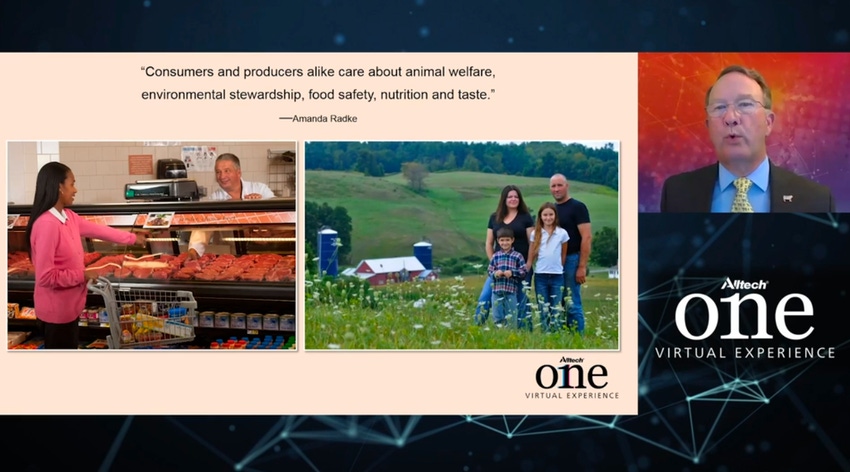A forage specialist connects the dots between ruminant animal agriculture and metabolic health.
May 20, 2020

My friend and fellow beef advocate, Dr. Peter Ballerstedt, spoke at the Alltech ONE Virtual Experience this week, and I love the way he pieces together the elements of ruminant animals and the benefits they have on the environment and on human health.
Ballerstedt is a forage agriculture expert and a tireless champion for therapeutic carbohydrate reduction. He loves the land, livestock and the resulting nutrient-dense beef we can derive from it. In other words, he speaks my language, and his message is so incredibly important!
He told the audience of 22,000+ viewers from 126 countries, “I’ve had a pretty profound personal experience that transformed my health primarily through lifestyle intervention, which is diet. What I’ve come to understand is there is a beautiful connection between ruminant animal agriculture and metabolic human health.”
He added, “As a result of that personal experience, I’ve gotten to meet a number of researchers and clinicians who are helping human beings around the world become healthier. What is interesting is that when I go to those conferences, I’m the only forage expert in the audience, so I get the privilege of introducing that tribe to what ruminant agriculture has to offer.”
These audiences include health and nutrition influencers, leaders in the ketogenic space, low-carb enthusiasts and others who are looking at how animal products can benefit their health, but maybe have a rudimentary understanding of how meat, dairy and eggs get to the dinner table.
Ballerstedt suggested a shift in how we present beef as a health product may be warranted.
“We may need to evolve new marketing strategies and rebrand beef as a fermented plant product and a real health food.”
He said in conversations with urban, health-conscious consumers, he has gained a deeper appreciation for how non-agricultural audiences look at what we do in agriculture. As a result, he is constantly looking for ways to debunk common myths surrounding nutrition, environment and beef as a health food.
“In ruminant animal agriculture, we have a very powerful message, and frankly, I think we have the best story going,” he said. “We can have healthy soils and healthy people, all thanks to ruminant animal agriculture. There’s a growing understanding and interest in the broad topic of soil health, but helping the public understand the limiting nature of our agricultural soils and how we must be good stewards of them is critical.”
And whether you’re a rancher or an urban mom, Ballerstedt says health is one of those things that cuts across all the tribes; it’s of interest to all of us.
“One of the issues I hear quite often is that doctors recommend their patients consume little or no meat,” he said. “What are those recommendations based on? I’m not a doctor, but I’m very happy to share the research articles and publications to make the connections with our health care providers.
“We have really good news about beef, but we may need to review that eating red meat won’t make you fat, give you diabetes, cause cancer, kill your kidneys, acidify your blood or melt your bones. These are all common statements, but there is no scientific evidence to support them.”
Looking at meat consumption from an ethical perspective, he added, “Eating meat, or other animal products, won’t make you morally weak either. There’s a great influence of world view and belief systems in dietary guidelines, and we need to recognize that when having these conversations. We must also explain that eating beef will not deprive you of food, drive climate change or destroy the planet.”
Another myth he often hears is that we could simply stop raising livestock and start raising crops for human consumption instead.
“The simple truth is the vast majority of the Earth’s surface is not suitable for cultivation,” he said. “At the same time, we have almost six times the land that’s in rangeland or forestland where we could have some form of ruminant animal system producing high-quality animal source foods for human consumption.”
In his presentation, he tackled other common misconceptions that I don’t have space to cover in today’s blog, but he summarized with this:
“As a society, I hope we can agree on two things. First, we need to focus on adequate essential nutrition and obtaining that however a person chooses to do that.
“We also need to focus on the message of metabolic health. Too long we have been told to focus on very poor metrics of health, and there are better ones to employ. A one-size-fits-all approach does not fit the human population, and people should be taught how to monitor their diets to achieve optimal metabolic health and adjust to continue to make changes,” he said.
Ultimately, if consumers could feel more confident in beef as a health food, as a positive environmental food and as a great choice for their health and the planet’s health, how would that shift dynamics at the grocery store?
Ballerstedt said, “What would be the impact of people coming to understand that beef, in fact, is a health food and not a health hazard? That grazing animals are essential to grassland health? That forage systems are part of crop systems? That there is no either/or? That if we are going to meet the goals of two-thirds increase of animal-source protein by 2050 that we have to increase the efficiency of animal agriculture globally?”
This is our challenge and our mission — to alleviate the guilt, concerns, misconceptions and fears consumers have about beef and replace it with confidence, enthusiasm and appreciation for a great-tasting, nutrient-dense, plant-friendly product they can enjoy without fear!
Register to watch Ballerstedt's session during the Alltech ONE Virtual Experience by clicking here.
The opinions of Amanda Radke are not necessarily those of beefmagazine.com or Farm Progress.
About the Author(s)
You May Also Like



.png?width=300&auto=webp&quality=80&disable=upscale)
.png?width=300&auto=webp&quality=80&disable=upscale)
